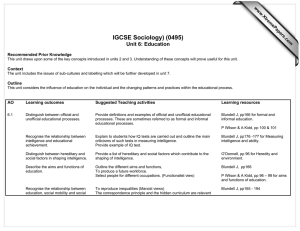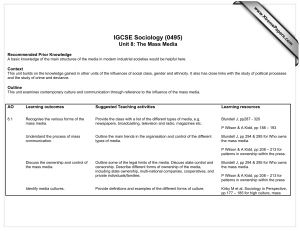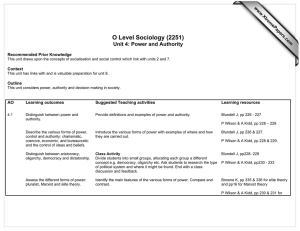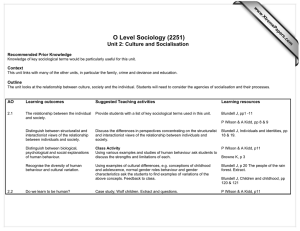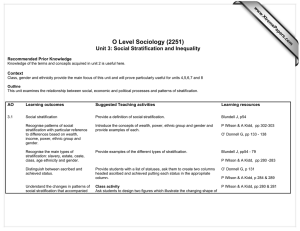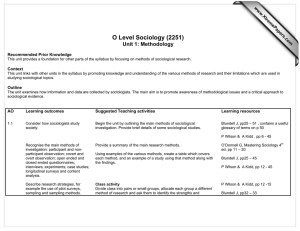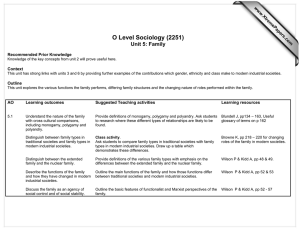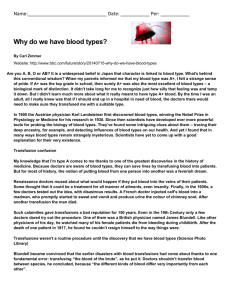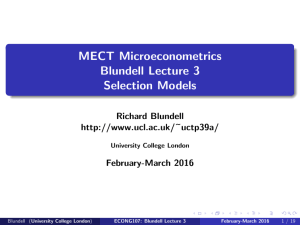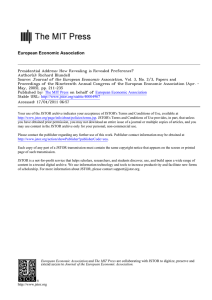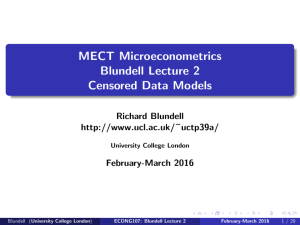O Level Sociology) (2251) Unit 6: Education www.XtremePapers.com
advertisement
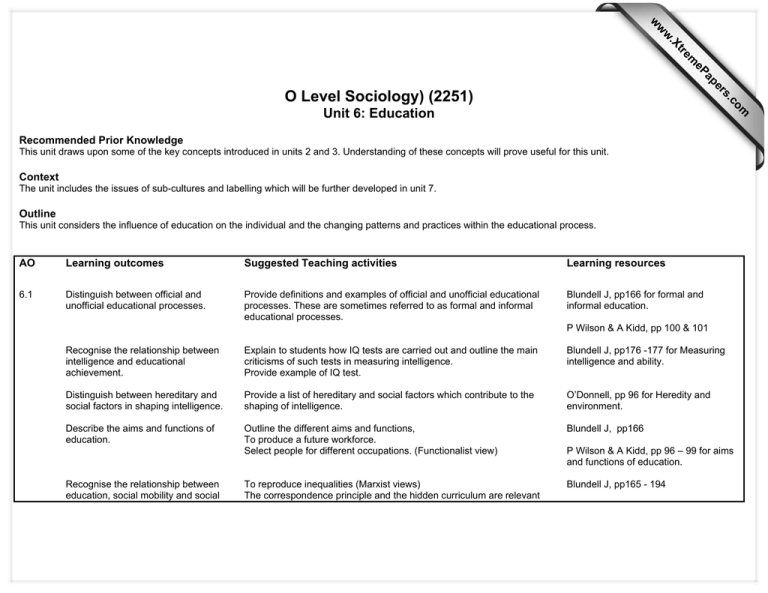
s er ap eP m e tr .X w w w om .c O Level Sociology) (2251) Unit 6: Education Recommended Prior Knowledge This unit draws upon some of the key concepts introduced in units 2 and 3. Understanding of these concepts will prove useful for this unit. Context The unit includes the issues of sub-cultures and labelling which will be further developed in unit 7. Outline This unit considers the influence of education on the individual and the changing patterns and practices within the educational process. AO Learning outcomes Suggested Teaching activities Learning resources 6.1 Distinguish between official and unofficial educational processes. Provide definitions and examples of official and unofficial educational processes. These are sometimes referred to as formal and informal educational processes. Blundell J, pp166 for formal and informal education. P Wilson & A Kidd, pp 100 & 101 Recognise the relationship between intelligence and educational achievement. Explain to students how IQ tests are carried out and outline the main criticisms of such tests in measuring intelligence. Provide example of IQ test. Blundell J, pp176 -177 for Measuring intelligence and ability. Distinguish between hereditary and social factors in shaping intelligence. Provide a list of hereditary and social factors which contribute to the shaping of intelligence. O’Donnell, pp 96 for Heredity and environment. Describe the aims and functions of education. Outline the different aims and functions, To produce a future workforce. Select people for different occupations. (Functionalist view) Blundell J, pp166 To reproduce inequalities (Marxist views) The correspondence principle and the hidden curriculum are relevant Blundell J, pp165 - 194 Recognise the relationship between education, social mobility and social P Wilson & A Kidd, pp 96 – 99 for aims and functions of education. 6.2 stratification. here. Browne K, pp 270 & 271 for Features of the hidden curriculum. Discuss education as an agency of social control and social stability. To ensure that people conform to society’s norms and values. Functionalist and Marxist views are relevant here. Browne K, pp 268 273 for socialisation, and social control Recognise education as an influence for social changes. To meet the demands of an ever changing society. Browne K, p 268 for Education and the Economy. Describe alternatives to schools and schooling. Outline the concept of ‘deschooling’ and home schooling as alternatives to the education system. Blundell J, p 167 for a negative view of schools. Explaining differences in educational achievement. Explain to class what is meant by educational achievement/underachievement. Blundell J, pp165 - 194 Distinguish the differences in educational achievement and experience in relation to gender, ethnic group and social class. Class activity Divide class into three groups, allocate each group one of the factors which influences educational achievement i.e. gender, ethnicity or social class. Ask groups to research the main explanations for underachievement in relation to their factor. Blundell J, pp 178 – 183 for education and class, gender and ethnicity. Recognise the influence of home and community background on differences in educational achievement. Class activity Provide students with a list of factors that can have an effect on educational performance, for example, poor housing conditions, overcrowding, streaming, labelling, language codes etc. Ask students to place each factor in categories of either ‘home background’ or ‘inside school’ factors. Be aware that some factors e.g. ‘expectations’ can be placed into both categories. P Wilson & A Kidd, pp 122 – 129 for material and cultural factors affecting education. Distinguish between the curriculum and the hidden curriculum. Design an activity in which students are required to place different factors into either ‘formal curriculum’ or ‘hidden curriculum’. Blundell J, pp165 - 194 Describe the culture of schools and social interaction in the classroom. Explain the middle class nature of schools and how this can influence both pupil/teacher and pupil/pupil interaction. Blundell J, pp165 - 194 P Wilson & A Kidd, pp 130 – 143 for class, gender and ethnicity. Browne K, pp 288 & 289 for Home factors and parental attitudes. P Wilson & A Kidd, pp 178 & 179 and pp182 & 183 Understand language and culture as dimensions of social inequality in education systems. Explain the concepts of restricted and elaborated language codes and their links to ethnicity and social class. Use examples to illustrate your points. Browne K, pp 290 & 291 for restricted and elaborated language codes. Class activity As a class ask students to think about their own school life and try to identify peer groups within it. Are there gender peer groups, ethnic peer groups, pro - school or antischool peer groups. Discuss the issues raised linking them to the influence peer groups can have on educational achievement. P Wilson & A Kidd, p128 Discuss the influence of peer groups. Browne K, p 261 for The anti-school subculture.
